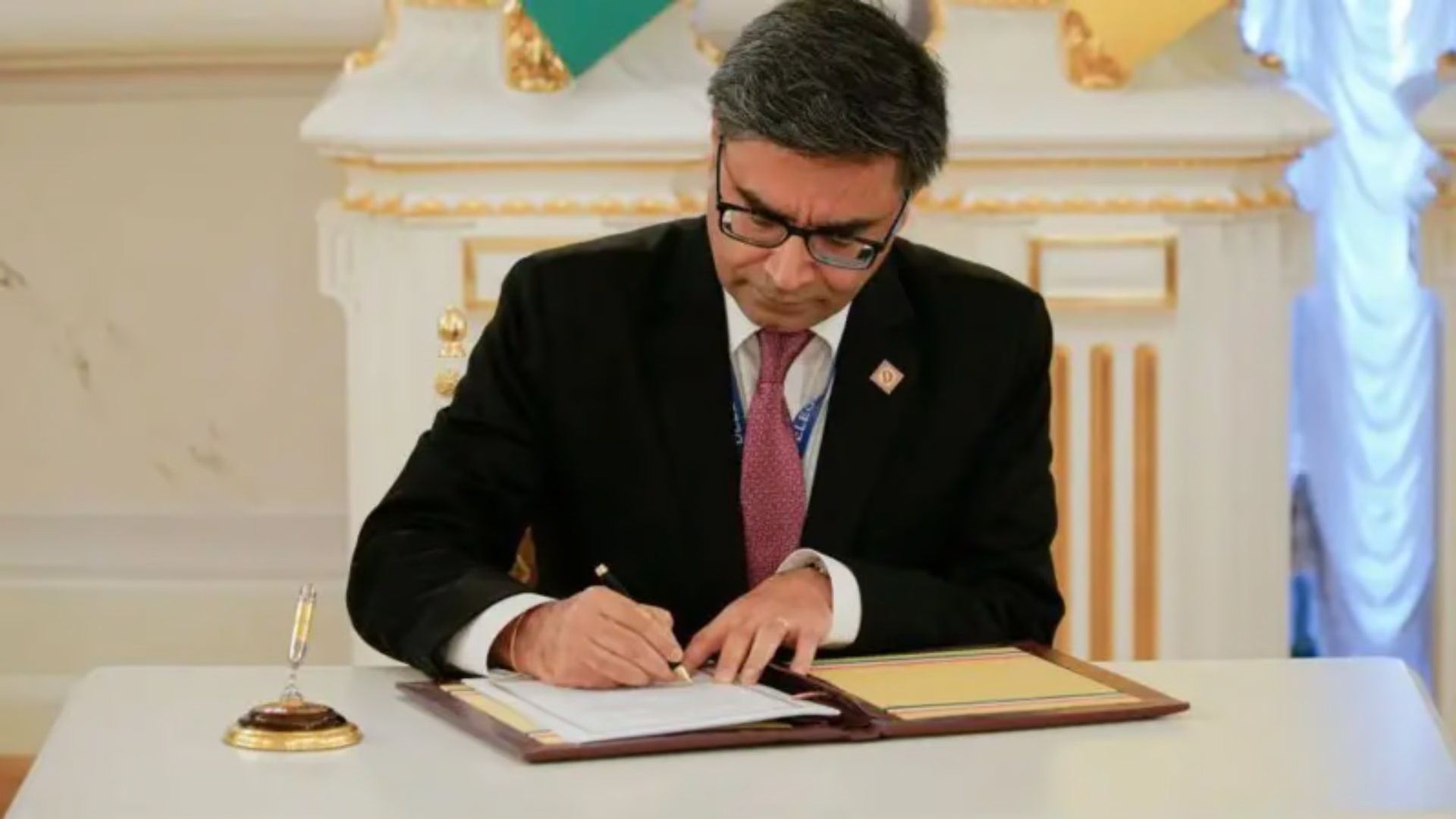India’s Foreign Secretary Vikram Misri will visit Bangladesh on December 9.
On Friday, India’s Foreign Ministry spokesperson Randhir Jaiswal said that Vikram Misri will hold several meetings during this visit.
Vikram Misri is going to Dhaka when there is a situation of tension between the two countries. After Sheikh Hasina was ousted from power, India has repeatedly expressed concern over the safety of other minorities including Hindus in Bangladesh.
On the other hand, Bangladesh has been rejecting India’s concerns. Bangladesh has even said that India is interfering in its internal affairs.
Sheikh Hasina has been living in India since leaving power on August 5 and Bangladesh is under the command of Mohammad Yunus.
In a press conference of the Ministry of External Affairs on Friday, Randhir Jaiswal said, “On December 9, the Foreign Secretary will visit Bangladesh and meet his counterpart. Apart from this, there will be many more meetings.”
Last week, the building of Bangladesh’s Deputy High Commission in Agartala, the capital of Tripura, was vandalized.
Bangladesh reacted sharply to this and India regretted it.
India also took action for laxity in security in this matter, but Bangladesh stopped visa service in the Agartala Mission.
According to Bangladesh’s newspaper ‘Prothom Alo’, Bangladesh had directed its Kolkata Deputy High Commission’s Deputy High Commissioner Shikdar Mohammad Ashrafur Rahman, and Agartala Deputy High Commission’s Deputy High Commissioner Arifur Rahman to return.
Strategic affairs expert Brahma Chelani has raised questions about Vikram Misri’s visit to Bangladesh.
He has written in a post on his X account, “Attacks on minorities and Awami League members are continuing in Bangladesh. Mohammad Yunus is holding meetings with anti-Sheikh Hasina parties and student groups and discussing the strategy to counter India. In such a situation, why is India sending its foreign secretary to Dhaka?”
Warmness in relations between Bangladesh and Pakistan
Amid the deteriorating relations between India and Bangladesh, Pakistan’s warmth with Mohammad Yunus’ government seems to be increasing.
Pakistan and Bangladesh have given many relaxations in visa rules for the citizens of both countries. Along with this, for the first time since the formation of Bangladesh, a cargo ship from Karachi reached Bangladesh’s Chittagong port last month. This was the first sea contact between the two countries.
Pakistan’s High Commissioner in Bangladesh Syed Ahmed Maruf has said in an interview with Samay TV that air connectivity between Islamabad and Dhaka will also start next year.
However, if a flight comes from Islamabad to Dhaka, it will have to use India’s airspace and for this, India’s permission is needed.
On the question of using India’s airspace, Maruf said, “There are rules regarding international aviation and you cannot stop it. I don’t think there will be any problem with this. No country should be afraid of the growing contact between Bangladesh and Pakistan. Rice, wheat, onion, and potatoes can be exported from Pakistan to Bangladesh. There are ample possibilities of bilateral trade between the two countries.”
Taslima Nasreen, an exiled Bangladeshi writer living in India, has criticized the interim government of Mohammad Yunus over the growing closeness with Pakistan.
She has written, ”India lost the lives of its 17 thousand soldiers to save Bangladeshis from enemy Pakistan and now the same India is being considered an enemy. India gave shelter, food, and clothing to one crore Bangladeshi refugees and the same India is now an enemy. India gave training along with weapons to protect them from Pakistani soldiers but now the same India is an enemy.”
Taslima Nasreen said, ”Pakistan killed lakhs of Bangladeshis and raped women, it is now being called a friend. Pakistan is number one in producing terrorists, now it is being considered a friend. Pakistan, which did not even apologize for the atrocities of 1971, is now considered a friend of Bangladesh.”
What do Bangladesh experts say?
M Humayun Kabir, former Bangladesh ambassador to the US, believes that the complexity of relations with India is increasing.
Humayun Kabir told Bangladesh’s newspaper ‘Prothom Alo’, “Bangladesh’s relations with India have been multi-faceted. Currently, Bangladesh’s economic relations with India are one-sided. We import electricity, diesel, rice, onions, and potatoes from India. But very few things are exported from Bangladesh to India.”
“We have also had cultural relations with India. A large number of people from Bangladesh used to go to Delhi for studies. In the last 15 years, people of Bangladesh used to get visas easily to go to India, but after August, the strictness regarding visas has increased. If India wants to improve relations, then it should liberalize the process of granting visas.”
Humayun Kabir says, “The tension between the two countries is increasing because India did not accept the reality of Bangladesh’s domestic politics after August 5. Bangladesh should also be cautious that the situation does not get out of control. I think that there should be no activities that provoke people in both countries.”
Want to promote your website organically contact us and rank your website with our SEO expert
Humayun Kabir said, ”After the change of power in Bangladesh, Dr. Mohammad Yunus had made it clear that relations with India will move forward based on equality. While talking to journalists from India, Mohammad Yunus had also said that he wants to improve bilateral relations.”
”Bangladesh had tried in September to have Mohammad Yunus meet PM Modi during the United Nations General Assembly in New York but it could not happen. After August 5, not much effort has been made to improve relations between the two countries.”
Humayun Kabir says, ”The problem is that India is not able to accept the political change in Bangladesh. They felt that maintaining strong relations with only one party of Bangladesh is enough. Everyone knows how India’s then-Foreign Secretary Sujatha Singh influenced the elections in Bangladesh in 2014. We saw this in 2018 and 2024 as well. India should understand what the people of Bangladesh want.


